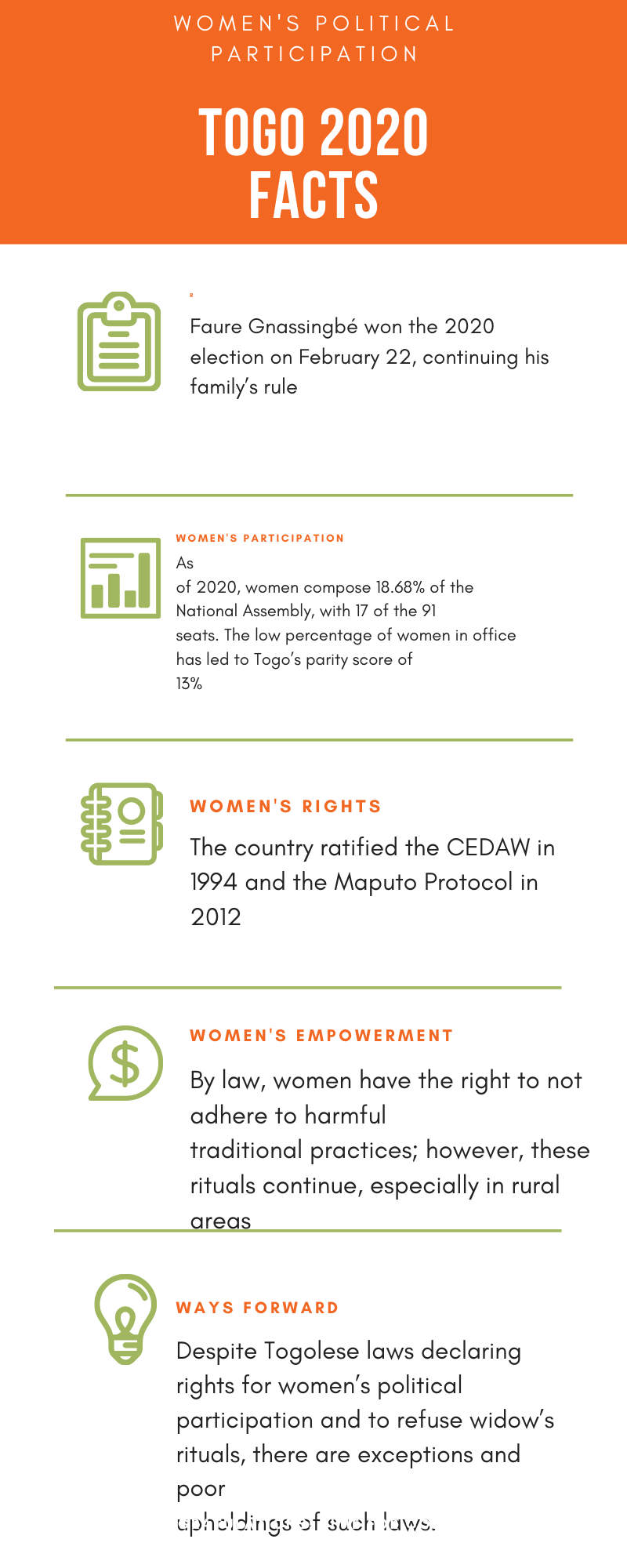By: Haleemah Shajira
Heading into the 2020 presidential election, Faure Gnassingbé was wrapping up his third presidential term, since becoming president in 2005. Prior to Faure Gnassingbé, his father, Gnassingbé Eyadéma, ruled for 38 years. Faure Gnassingbé won the 2020 election on February 22, continuing his family’s rule. Six male candidates ran against Faure Gnassingbé; the primary rivals were Gabriel Messan Agbeyome Kodjo, former prime minister, and Jean Pierre Fabre, head of the National Alliance for Change party.
Faure Gnassingbé utilises a platform based on security, as jihadist forces create instability and violence to Togo’s north, and promises to fight poverty as over half of the country lives with less than $1.90 (€1.75) per day, as estimated by the World Health Organization. However, there is political unrest and a lack of trust in Togo’s election credibility.
Togo holds presidential elections every five years. The president holds the position of Chief of State, while the prime minister holds the position of Head of Government. The legislative body is the National Assembly, composed of 91 seats, with terms lasting five years and members appointed through direct elections.
Women’s Political Participation
Togo’s Constitution provides suffrage to women and men aged 18 years and older, although this right is not given to people living with disabilities. Furthermore, Togolese tradition and cultural practices may limit women’s voting rights and abilities despite constitutional legality. The Constitution also calls for women and men to have the right to run for a political position, but the 2012 Electoral Code denies this to people with disabilities.
The 2013 Electoral Code, in addition to calling for equal gender representation on candidate lists, also “requires a portion of the public funding allocated to political parties to be distributed in proportion to the number of women elected in previous elections, both at the national and local levels.” This provides a form of gender quota for women in politics.
As of 2020, women compose 18.68% of the National Assembly, with 17 of the 91 seats. The low percentage of women in office has led to Togo’s parity score of 13%, meaning Togo’s gender composition in politics is only 13% towards being an even split between female and male.
In January 2019, Yawa Djigbodi Tsegan took office as President of the National Assembly (also known as the Speaker of the National Assembly), marking a significant leadership position for women in legislation.
Of Togo’s 8 million residents, there are 3.6 million registered voters. In the 2015 presidential election, there was a reported turnout of 60.94%, which was down from the 2010 presidential election, with 64.68% turnout. The 2020 presidential election saw an increase, with 76.62% voter turnout.
Many Togolese residents feel elections are “neither free nor fair,” which led to pledges to not participate in 2020 voting. Prior to the 2020 election, Faure Gnassingbé adjusted the Constitution so that he now has the potential to serve in office until 2030. Additionally, Togo has a history of rigged elections. In 2020, despite significant efforts and pushes for monitored elections, authorities prohibited measures against rigging, including local monitors and an electronic security system. The 2020 election also saw no female candidates, and between 1946 and 2019 Togo has not had a female president.
In addition to the threats of jihadist violence and poverty, Togolese women face various other threats. Traditional practices allow a widow to be raped, forced into isolation and/or marriage, lose her inheritance, and be denied food and work. Such rituals put women at risk of contracting HIV and experiencing greater economic strain. By law, women have the right to not adhere to these traditional practices; however, these rituals continue, especially in rural areas and communities lacking access to resources and education for women on how to refuse these rituals.
Conclusion
Incumbent Faure Gnassingbé won Togo’s 2020 presidential election, continuing his family’s presidential rule of over 50 years. No female candidates ran in this presidential election, there has not been a female president between 1946 and 2019. There are 17 females in the National Assembly, with female representation at 18.86% of the 91 seats. Yawa Djigbodi Tsegan is the speaker for the National Assembly; she took office in January 2019.
Togolese women face threats from traditional rituals surrounding widowing, limited economic income, and violence. Despite Togolese laws declaring rights for women’s political participation and to refuse widow’s rituals, there are exceptions and poor upholdings of such laws.

